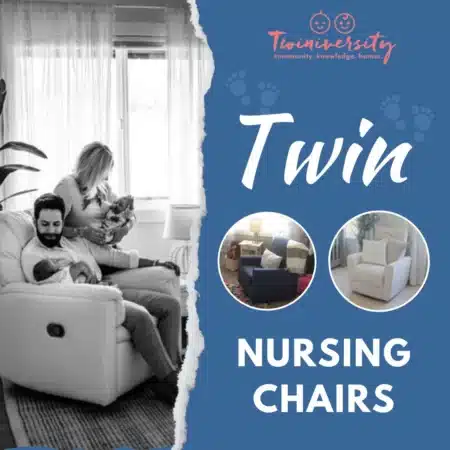Last updated on September 30th, 2021 at 10:11 am
Whether your multiples are identical or not, there are certain expectations that just because they shared a uterus, they’re going to share everything. Their looks, temperament, interests, and development will be compared from the moment they make their debut in this world. While this is a nuisance for all parents of multiples, for those of us who have a twin with a medical condition and/or disability it can be a particularly painful observation to hear over and over and over. AND OVER.
We already know very specifically, down to the cellular level, just how different our kids are and what that means for them and some days, people just won’t let us forget it. Our friends, family, and random strangers wonder aloud who is going to walk and talk first, they comment on who gets better grades, and which kid is better at sports, completely oblivious to how hurtful their remarks can be to the kids and their parents. Some medical conditions are not as obvious to the casual observer, but nonetheless have a very profound impact on the child’s development, making it very unfair to compare them. People expect a comparison between any siblings, especially twins, to be apples to apples, but for some of us our twins are more like apples and oranges and need to be treated this way.
Whether one of your kiddos has cerebral palsy, Downs Syndrome, a congenital heart defect, or autism, every aspect of their development is going to differ from their sibling’s significantly. It’s a dangerous game to constantly compare any siblings, but when you’re trying to compare a kid with a medical condition to their sibling that doesn’t, you’re instantly making unattainable goals for them. You’re setting them up to fail over and over again. Here are a few things I’ve learned in the last 17 months and 2 days to help raise twins of different abilities.
Drop All Pre-Conceived Notions Regarding What Is “normal.”
Your kids may have been born together, but their development will be on completely different timelines now. For example, while it’s normal for healthy kids to start walking around their first birthday, a child who’s spent significant time in the hospital, had surgeries, or has weakness or tightness has a lot more to overcome than their twin. Not only do they have to acquire the usual amount of strength and balance, but they have to conquer their other problems as well. They have a new “normal” which is completely unique to them and is independent of the way their siblings are developing. Don’t lament over WHEN they accomplish a goal, just celebrate that they were able to achieve it. Trust me, they had to work a lot harder to do it. If two people finish a marathon, is the person who finished last really a loser? Not in my book – they finished! Now what if you learned that person was running on a prosthetic leg? I think that makes them even more incredible than the first person to finish, and they’re both in much better shape than I am! Yes, people are still going to notice the difference between your kids and they’re going to make comments. But you don’t have to care. Either ignore them and move on, or take the opportunity to educate them.

Divide Your Time As Equally As Possible Between Them, But Don’t Obsess About It.
Every child goes through phases where they demand more or less of your attention and this is true of kids with medical conditions as well. I spent the first year of my twin’s lives agonizing over the fact that Danny was monopolizing my attention for his physical, occupational, and speech therapies and I felt like I was neglecting Andrew. Luckily, Andrew was a low-maintenance baby and didn’t seem to mind. He was perfectly happy playing with his feet for a good two months. Now in their second year, Andrew has turned into a wild toddler who can’t be left unsupervised for a second without causing complete mayhem, while Danny is able to play independently for longer periods. You don’t have to divide your attention between them 50/50. They will let you know when they need more attention from you and then you can make the effort to even things out. Watch for the subtle (or not so subtle) cues in their behavior that indicate they need more attention. Just as we get used to their hungry cry vs their tired cry, you will learn to pick up on the early behavioral cues they give before things have escalated to a full-on tantrum. For example, I knew Andrew needed a little more mommy time when he started getting more fussy and clingy, throwing his toys, or breaking rules he usually respected.
Multi-Task
So what do you do when they both seem to need you at the same time? As a physical therapist and as a mom of a kid with a medical condition, I recommend incorporating siblings into treatment as much as possible. This way, you’re not always forced to choose between your children (because I assure you, it’s agonizing) and siblings can be surprisingly helpful. His doctors have often commented that Danny should be more delayed than he is, but he has a twin and an older brother to watch and try to keep up with. He saw them having fun sitting, so he wanted to sit. He saw them crawling and walking and he learned to do those things too so he could keep up. Nate is a great big brother, bringing me toys and making Danny laugh while I do exercises with him and whatever I have Danny work on, I give him a rest break every 10 minutes or so and do something with Andrew. It looks like a three ring circus, but you know what? There’s a reason so many people will pay to go to the circus: IT’s FUN!

Do The Obvious – Ask For Help!
You are only one person and even if you have a great, supportive, helpful spouse, there’s often just one of you focusing on the kids at any given moment so the other can work, shower, cook, etc. If you have a friend or family member who would be willing to come for even an hour a few times a week to allow you to get some quality 1:1 time with your other children, do it. My mom stops by on her lunch hour 1-2 times each week so I can eat, shower, or just get some of that 1:1 time with Andrew or Nate if I feel I’ve been neglecting them. It makes all of us feel better. I also utilize the time when Danny’s therapists come out to treat him to spend time with Andrew and Nathaniel. The therapist works with Danny while I do the same thing with Drew and we keep Nate busy singing us songs and picking out the toys for Dan and Drew to use.
Stagger Schedules
As a last resort, I have also flip-flopped the twins’ schedules. While they normally nap and eat together, there have been times I felt they really needed more individual attention so I put one down for their nap 30 minutes early and one 30 minutes late to allow that to happen. This isn’t always possible because they may not WANT to nap early, but if I saw an opportunity where Danny was getting sleepy a little early I’d give it a try. This does require you to sacrifice your alone time to shower, eat, and tackle the mountain of laundry you’re buried under, but none of us are new to the concept of sacrificing things for our kids, right? I don’t do it on a regular basis and I try to just shift the schedule by 30 minutes so I didn’t throw them totally out of whack, but it helps tremendously when Drew or Nate need more Mommy Time.

Take a step back
We can start to look at every decision we make under a microscope and under that kind of scrutiny, we don’t have a chance of succeeding. I became so guilt-ridden for letting Andrew hop away in the jumper so I could work on Danny’s feeding issues, it took some very enlightening advice from my husband to help me snap out of it. He asked me if it was more important for our family as a whole to spend that 30 minutes teaching Danny to eat so he can have the feeding tube removed and make our lives easier (it’s hard to leave the house a lot when your child is dependent on dragging around a feeding pump and all its necessary supplies) or should I play pat-a-cake with Drew. Which one of those options is going to have the greatest long-term benefit for our entire family? Even if I don’t like the sacrifice I have to make in the moment, by getting a little perspective I can usually see the long-term value and it has helped assuage my mommy guilt a lot.
All parents struggle to find a balance between household chores, job responsibilities, and spending quality time with our children. Parents of multiples get a double (or triple, or quadruple…) dose of the guilt associated with being forced to choose between spending time with one child or the other. Add a kid with a medical condition on top of that and you have the perfect recipe for an anxiety disorder. No matter how wonderful your intentions, it comes down to simple mathematics: there’s one you, and at least two of them. You aren’t going to be able to give 100% of your attention to all your kids all the time. Every day you will have to triage like an emergency room doctor and decide which one of the 427 things on your to-do list takes top priority. If you have three doctor appointments for your special needs child today, then that’s your top priority and you do the best you can with the other kids and know that tomorrow you will focus on them more. We are forced to make many tough decisions as parents, but by keeping things in perspective, getting creative with multi-tasking and scheduling, and learning realistic expectations for ourselves and our children, we don’t have to live with the constant guilt and anxiety.
 Diana Schneider lives near Ann Arbor, Michigan with her husband and three boys. She’s a part-time physical therapist and full-time mom who enjoys sleeping through the night, finishing sentences without interruption, and stepping on floors that aren’t littered with building blocks. She hopes to do one of those things again someday.
Diana Schneider lives near Ann Arbor, Michigan with her husband and three boys. She’s a part-time physical therapist and full-time mom who enjoys sleeping through the night, finishing sentences without interruption, and stepping on floors that aren’t littered with building blocks. She hopes to do one of those things again someday.







